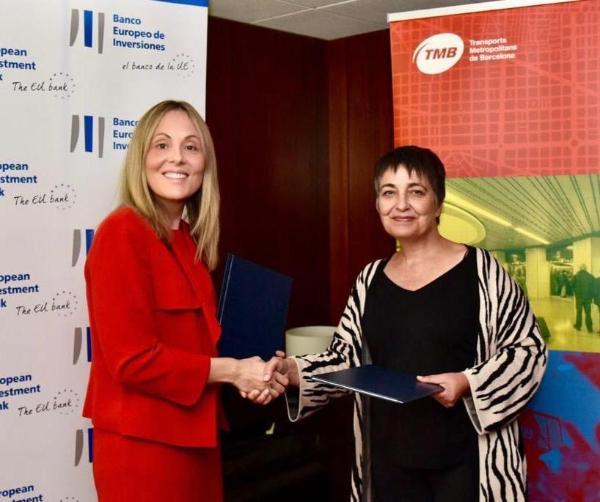
- The EU bank will provide TMB with up to EUR 205m in Juncker Plan financing to promote climate action
- Public banks ICO and ICF will provide additional loans of EUR 54m and EUR 50m, respectively, for withdrawing the network's oldest rolling stock
- The new trains will arrive between 2020 and 2022, have higher capacity and will help improve service quality
A EUR 268m operation to replace the 42 oldest trains running on the Barcelona metro was finalised today with the signature of the contracts covering the supply of the new rolling stock to local operator TMB and financing by the European Investment Bank (EIB), Instituto de Crédito Oficial (ICO), Institut Català de Finances (ICF) and several private sector entities.
The contract to provide 42 five-coach trains was awarded to Alstom following a public tender process, with the first two units set to be delivered in 2020 and the rest within two and a half years. The trains will be assembled at Alstom's Santa Perpètua de Mogoda plant in line with TMB's sustainability criteria: lightweight body, low energy consumption, highly recoverable and recyclable components, technical reliability and ease of maintenance.
For this rolling stock purchase – which will enable all 3000 and 4000 series trains to be withdrawn – TMB has engaged in a number of very long-term loan operations with public and private sector entities with the permission of the Board of Directors of the Barcelona Metropolitan Transport Authority (ATM).
The EIB will finance most of the replacement programme for the trains – set to enter service on lines 1 and 3 of the Barcelona metro – by providing up to EUR 205m to TMB. These funds will go towards the replacement of 42 trainsets that have been in service for 35 years with new versions equipped with state-of-the-art technology to improve safety, waiting times and service comfort. The new carriages will also have an increased capacity, accommodating 1 100 passengers on line 1 and 900 on line 3.
The EIB support will help promote climate action by improving the quality of public transport, thereby encouraging people to use it instead of their cars and cutting emissions in Barcelona. The new trains will also be quieter and use up to 20% less energy. The EU bank is providing these funds with Investment Plan for Europe support.
To complete the operation, TMB received EUR 54m in financing from Instituto de Crédito Oficial (ICO), a public sector entity under the aegis of the Spanish Ministry of Economy and Business, and EUR 50m from Institut Català de Finances (ICF), a public sector financial entity owned by the Government of Catalonia. Bankinter and Liberbank have also granted loans of EUR 6.4m each.
EIB Vice-President Emma Navarro, who is responsible for EIB activity in Spain and the Bank's climate action, highlighted “the clear environmental benefits of a project that is perfectly in line with one of the EIB's main priorities in Spain – facilitating the mobilisation of resources to protect the climate by assisting with the environmental transition, promoting clean urban transport and cutting pollution in Spanish cities. As we announced at the recent UN Climate Action Summit, the EIB is committed to increasing its climate action and expanding the resources it dedicates to tackling climate change and other environmental objectives, representing a key step in consolidating the EIB's position as the EU climate bank.”
European Commissioner for Transport Violeta Bulc added: “Thanks to this investment through the Juncker Plan, the citizens of Barcelona will enjoy more comfortable, modern and energy-efficient metro trains on their everyday commute. And in addition to that, by using recyclable material, the modernisation was carried out in line with our continuous efforts to support sustainable transport.”
TMB President Rosa Alarcón said: “By withdrawing the oldest part of our fleet, we are accelerating a renewal process that will improve service reliability, sustainability and passenger comfort on two of our busiest metro lines. This comes at a time of exceptional demand for public transport in Barcelona due to the implementation of a low-emissions zone. This is TMB's largest ever rolling stock purchase.”
The EIB and climate action
The EIB is among the multilateral institutions providing the most finance for climate action worldwide. The Bank's goal is to be a leader in mobilising the finance needed to keep global warming to under 2 ˚C and limit temperature rises to 1.5 ˚C to meet the Paris Agreement objectives. At September's Climate Action Summit in New York, the EIB Group announced that it intends to expand its climate action, gradually increasing the financing it dedicates to climate and environmental objectives to 50% of its activity by 2025 and mobilising up to EUR 1tn by 2030 to support investments helping to achieve these goals. It also announced its intention to align all EIB Group activities with the Paris Agreement.
Today’s agreement is the second in Barcelona and fifth in Spain to be implemented under the EIB's Cleaner Transport Facility programme to promote cleaner transport systems in Europe. Under this initiative, the EIB has provided financing to renew the city bus fleets of Las Palmas, Palma de Mallorca, Valencia and Barcelona. The EIB financed most of these projects under the Investment Plan for Europe (the Juncker Plan), whose guarantee makes it possible to support investments whose structure or nature means that they contribute to boosting economic growth and employment. The project agreed with TMB also has Juncker Plan support and will help to create 3 100 jobs for building the new trains.